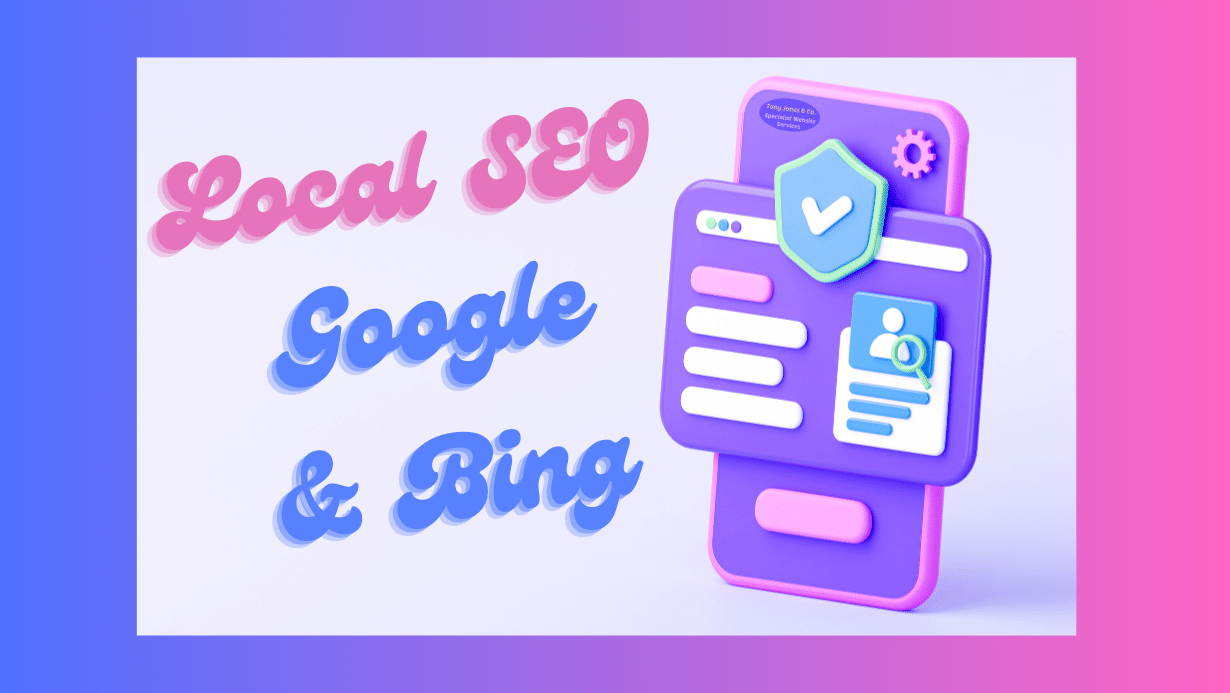Web Designer Wrexham, Professional Website Services - Tony Jones CITP, FBCS.
Fueling Business Growth: Insights from Website Analytics for Small Businesses
Building a Strong Online Presence

In today's digital age, having a business website is crucial for establishing a strong online presence. A website serves as a virtual storefront, allowing potential customers to learn about your business, products, and services. It acts as a central hub for your online marketing efforts, providing a platform to showcase your brand and engage with your target audience.
The Importance of a Business Website
A business website offers numerous benefits for small businesses. Firstly, it provides credibility and legitimacy to your brand. In the eyes of consumers, a business without a website may appear less professional or trustworthy. Having a well-designed and informative website can help instill confidence in potential customers and differentiate you from competitors.
Additionally, a website serves as a 24/7 marketing tool. Unlike traditional brick-and-mortar stores with limited operating hours, your website is accessible at all times, allowing potential customers to learn about your products or services whenever it's convenient for them. This can significantly expand your reach and attract new customers.
A business website also provides a platform for effective online marketing strategies such as search engine optimization (SEO). By optimizing your website content and structure, you can improve your visibility in search engine results and drive organic traffic. For more information on SEO for small business websites, check out our article here.
Key Requirements for Setting Up a Small Business Website
Setting up a small business website involves several key requirements. Here are some essential steps to consider:
- Domain Name: Choose a domain name that reflects your brand and is easy for customers to remember. It should be unique and preferably include your business name or relevant keywords.
- Web Hosting: Select a reliable web hosting provider that offers sufficient storage space and bandwidth to accommodate your website's needs. Consider factors such as uptime guarantees, technical support, and scalability options.
- Website Design: Create a visually appealing and user-friendly website design that aligns with your brand identity. Ensure that your website is mobile-responsive, as an increasing number of users access the internet through mobile devices.
- Content Management System (CMS): Choose a CMS platform that suits your needs and technical expertise. Popular options include WordPress, Joomla, and Drupal. A CMS allows you to easily update and manage your website content.
- Website Security: Implement necessary security measures to protect your website and customer data from cyber threats. This includes using secure hosting, installing SSL certificates, and regularly updating your website's software. For more information on small business website security, refer to our article here.
By fulfilling these key requirements, you can establish a solid foundation for your small business website. Remember to regularly update your website with fresh and relevant content, optimize it for search engines, and provide a seamless user experience to maximize its effectiveness. For additional tips on small business website design, refer to our article here.
Introduction to Website Analytics
To effectively drive business growth, small businesses must understand the importance of website analytics. By analyzing and interpreting data about website performance, businesses can gain valuable insights into user behavior, engagement, and conversion rates. This section will provide an overview of website analytics and explain why it matters for small businesses.
Understanding Website Analytics
Website analytics refers to the measurement, collection, analysis, and reporting of data related to website performance. It involves tracking various metrics and key performance indicators (KPIs) to gain insights into how users interact with a website. Through website analytics, businesses can understand user behavior, identify areas for improvement, and make informed decisions to optimize their online presence.
Website analytics tools, such as Google Analytics and other similar platforms, provide comprehensive data on website traffic, user engagement, conversion rates, and more. These tools help businesses understand how visitors find their website, which pages they visit, how long they stay, and what actions they take. This data is crucial for making data-driven decisions to enhance the website's performance and drive business growth.
Why Website Analytics Matter for Small Businesses
For small businesses, website analytics is an invaluable resource that can provide significant advantages. Here are a few reasons why website analytics matter:
- Data-Driven Decision Making: Website analytics provides objective data that enables small businesses to make informed decisions. By understanding user behavior and preferences, businesses can optimize their website, improve marketing strategies, and tailor their products or services to meet customer needs.
- Identifying Opportunities for Improvement: Through website analytics, small businesses can identify areas of their website that may need improvement. By analyzing metrics such as bounce rates and exit rates, businesses can identify pages or elements that are not performing well and take corrective action.
- Tracking Marketing Campaigns: Website analytics helps small businesses evaluate the effectiveness of their marketing campaigns. By tracking metrics such as referral sources, traffic sources, and conversion rates, businesses can determine which marketing channels are driving the most traffic and conversions. This knowledge allows them to allocate resources effectively and optimize their marketing efforts.
- Monitoring Website Performance: Website analytics allows small businesses to monitor the overall performance of their website. By tracking metrics like website traffic, page load times, and user engagement, businesses can ensure that their website is functioning optimally and delivering a positive user experience.
By leveraging website analytics, small businesses can gain a competitive edge in the digital landscape. It enables them to understand their audience better, optimize their website, track marketing efforts, and make data-driven decisions to drive business growth.
For more insights on optimizing small business websites, check out our articles on SEO for small business websites and small business website design tips. Additionally, understanding the essential requirements for setting up a small business website is crucial, and you can explore more in our article on small business website requirements. Don't forget to prioritize website security by implementing the necessary measures outlined in our article on small business website security measures.
Key Metrics to Track
To effectively harness the power of website analytics for your small business, it's essential to understand and track key metrics that provide valuable insights into your website's performance. By monitoring these metrics, you can make data-driven decisions to optimize your online presence and drive business growth. Here are three key metrics to track:
Website Traffic
Website traffic refers to the number of visitors who land on your website within a specific period of time. Tracking website traffic allows you to gauge the popularity of your website and measure the effectiveness of your marketing efforts in driving visitors to your site.
By using tools like Google Analytics or other website analytics tools, you can gain valuable insights into your website traffic, such as the number of visitors, unique visitors, and page views. Monitoring your website traffic over time helps you identify trends and patterns, allowing you to make informed decisions to enhance your online presence.
User Engagement
User engagement metrics provide insights into how visitors interact with your website and the level of interest they show in your content. By tracking user engagement, you can gauge the effectiveness of your website in capturing and retaining the attention of your visitors.
Metrics to track user engagement include average session duration, bounce rate, and pages per session. Average session duration measures the average amount of time visitors spend on your website, indicating their level of engagement. A lower bounce rate indicates that visitors are exploring your website further and not leaving after viewing just one page. Pages per session measures the average number of pages visitors view during a single session, providing insights into the depth of their engagement.
Conversion Rates
Conversion rates measure the percentage of website visitors who complete a desired action, such as making a purchase, filling out a form, or subscribing to a newsletter. Tracking conversion rates is crucial for evaluating the effectiveness of your website in achieving your business goals.
Conversion rates can vary depending on the desired action you want your visitors to take. For example, an e-commerce website may track purchase conversion rates, while a service-based business may focus on lead generation conversion rates. By monitoring conversion rates, you can identify areas of improvement and optimize your website to increase conversions.
To effectively track these metrics, it's important to implement a reliable website analytics tool such as Google Analytics. This tool provides detailed reports and insights into your website's performance. For more information on setting up a small business website and optimizing it for success, check out our article on small business website requirements.
Regularly monitoring and analyzing these key metrics enables you to make data-driven decisions to improve your website's performance, enhance user experience, and drive business growth. Remember to set clear goals and objectives, regularly assess and interpret the data, and take action based on the insights gained from website analytics. With the right approach, website analytics can be a powerful tool to propel your small business forward.
Tools for Website Analytics
To effectively track and analyze the performance of your small business website, utilizing website analytics tools is essential. These tools provide valuable insights into visitor behavior, engagement, and conversion rates. In this section, we will explore two popular options: Google Analytics and other website analytics tools.
Google Analytics
Google Analytics is a widely used and powerful website analytics tool that offers a comprehensive range of features. It provides detailed information about your website's performance, user behavior, traffic sources, and much more. By implementing a small snippet of code on your website, you can start tracking valuable data and gaining insights into your audience.
Key features of Google Analytics include:
- Audience Analysis: Gain a deeper understanding of your website visitors, including their demographics, interests, and behavior patterns.
- Traffic Sources: Identify where your website traffic is coming from, whether it's through search engines, social media, or other referral sources.
- Behavior Flow: Visualize how visitors navigate through your website, allowing you to identify potential bottlenecks or areas for improvement.
- Conversion Tracking: Track and measure the effectiveness of your marketing campaigns and website goals, such as form submissions or online purchases.
Google Analytics provides a wealth of data that can help you make informed decisions to optimize your small business website. To learn more about the benefits of using SEO techniques to improve your website's visibility, check out our article on SEO for small business websites.
Other Website Analytics Tools
In addition to Google Analytics, there are several other website analytics tools available in the market. These tools offer varying features and functionalities, catering to different business needs and budgets. Some popular alternatives to consider include:
- Adobe Analytics: A comprehensive analytics solution that provides real-time data and advanced segmentation capabilities.
- Matomo: An open-source analytics platform that gives you full control over your data and offers customizable reporting options.
- Clicky: A user-friendly analytics tool that provides real-time data, heatmaps, and detailed visitor profiles.
- Mixpanel: A tool focused on user behavior analytics, allowing you to track and analyze specific actions or events on your website.
When choosing an alternative analytics tool, consider factors such as ease of use, scalability, pricing, and the specific insights you need for your business. It's important to select a tool that aligns with your goals and resources. For more guidance on designing an effective small business website, take a look at our article on small business website design tips.
By leveraging website analytics tools like Google Analytics or exploring other options, you can gain valuable insights into how your small business website is performing. These insights enable you to make data-driven decisions, improve user experience, and optimize your website for better engagement and conversion rates. Remember to regularly monitor and analyze your website data to stay informed about your audience and make informed business decisions.
Leveraging Website Analytics for Business Growth
To fuel business growth, small businesses can leverage the power of website analytics. By analyzing the data collected from their website, businesses can gain valuable insights that can drive improvements and inform decision-making. Here are three key ways in which website analytics can be leveraged for business growth: identifying opportunities for improvement, tracking marketing campaigns, and making informed business decisions.
Identifying Opportunities for Improvement
Website analytics provide small businesses with a wealth of information about their website's performance. By carefully examining metrics such as bounce rate, average session duration, and page views, businesses can identify areas where their website may be falling short. For example, a high bounce rate may indicate a need to improve the website's user experience or optimize the content to better meet user expectations.
Furthermore, analyzing user behavior through metrics like click-through rates and navigation paths can reveal specific pages or elements that are not performing well. Armed with this knowledge, businesses can make data-driven decisions to enhance their website's design, structure, and content. For more tips on optimizing small business websites, check out our article on small business website design tips.
Tracking Marketing Campaigns
Website analytics play a crucial role in tracking the success of marketing campaigns. By setting up goal conversions and tracking URLs, businesses can measure the effectiveness of their various marketing efforts, such as email campaigns, social media promotions, or pay-per-click advertisements. This data allows businesses to understand which campaigns are driving the most traffic, generating leads, or resulting in conversions.
By closely monitoring campaign performance through website analytics, small businesses can make informed decisions about where to allocate their marketing resources. They can optimize campaigns that are yielding positive results and adjust or eliminate those that aren't performing as desired. For more information on optimizing small business marketing efforts, visit our article on seo for small business websites.
Making Informed Business Decisions
Website analytics provide small businesses with valuable insights that can guide their overall business strategy. By examining demographic information, user preferences, and customer journeys, businesses can gain a deeper understanding of their target audience. This knowledge can inform decisions related to product development, pricing strategies, and marketing initiatives.
For example, website analytics can reveal which products or services are most popular among users, allowing businesses to focus their efforts on areas of high demand. Additionally, by analyzing conversion rates and sales funnels, businesses can identify potential bottlenecks in the customer journey and take steps to optimize the buying process. To learn more about essential website elements for small businesses, refer to our article on small business website requirements.
By leveraging website analytics, small businesses can gain valuable insights that drive growth and success. However, it's important to remember that effective use of website analytics requires an ongoing commitment. Regularly monitoring and analyzing data, setting clear goals and objectives, and taking action based on insights are all key steps in harnessing the power of website analytics. With the right approach, businesses can unlock the full potential of their website and fuel their growth journey.
Tips for Using Website Analytics Effectively
To make the most of website analytics for your small business, it's important to follow a few key tips. By implementing these strategies, you can gain valuable insights into your website's performance and use the data to drive business growth.
Set Clear Goals and Objectives
Before diving into website analytics, it's crucial to establish clear goals and objectives for your small business website. Ask yourself what you want to achieve with your online presence. Are you looking to increase website traffic, improve user engagement, or boost conversion rates? Setting specific and measurable goals will help you focus your efforts and track progress effectively.
For example, if your goal is to increase website traffic, you can use website analytics to monitor the number of visitors over time. By setting a target for monthly or quarterly traffic, you can measure the success of your marketing efforts and make necessary adjustments to drive more visitors to your site.
Regularly Monitor and Analyze Data
Consistent monitoring and analysis of website analytics data is essential for understanding how your small business website is performing. Make it a habit to regularly review the key metrics and indicators that are relevant to your goals. This includes tracking metrics such as website traffic, user engagement, and conversion rates.
By monitoring these metrics, you can identify trends, patterns, and areas that require improvement. For instance, if you notice a decline in website traffic, you can investigate the possible causes and take appropriate actions to address the issue. Regularly monitoring and analyzing data allows you to stay informed about your website's performance and make data-driven decisions.
Take Action Based on Insights
Website analytics provide valuable insights, but they are only beneficial if you take action based on the information you gather. Use the data to identify opportunities for improvement and implement changes accordingly. For example, if you notice a high bounce rate on a specific page, you can optimize the content or layout to encourage visitors to stay longer and explore further.
Additionally, website analytics can help you track the effectiveness of your marketing campaigns. By analyzing data on referral sources, you can identify which channels are driving the most traffic and conversions to your site. This information allows you to allocate your marketing budget and resources more effectively, focusing on the strategies that deliver the best results.
By setting clear goals, regularly monitoring data, and taking action based on insights, you can harness the power of website analytics to fuel the growth of your small business. Remember, website analytics is an ongoing process, and continuous improvement is key. Stay proactive and use the data to optimize your website, enhance user experience, and achieve your business objectives.
For more tips on optimizing your small business website, be sure to check out our articles on SEO for small business websites, small business website design tips, and small business website requirements.
About the author Tony Jones CITP FBCS:
An experienced and qualified Web Designer based in Wrexham, a Chartered IT Professional and a Fellow of the British Computer Society.
Contact us
We will get back to you as soon as possible
Please try again later
More news and articles: - Websites, Design, SEO, Artificial Intelligence, anything Digital Technology.

All Rights Reserved | TonyJones & Co.










